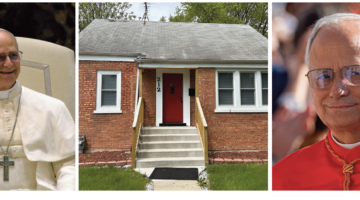 In college, God imparted invaluable knowledge to me. One lesson I learned is that preparing roads is hot, dirty, back-breaking work.
In college, God imparted invaluable knowledge to me. One lesson I learned is that preparing roads is hot, dirty, back-breaking work.
For several summers, I labored for an asphalt-paving company. Earning money for next year’s tuition was a blessing.
And, along with acquiring a work ethic, I learned the wisdom of working for those things worth having. Road work demands teamwork and persistence, and cannot be accomplished without planning.
My favorite jobs were laying the cobblestone streets of L’Enfant Plaza, and the walkways of Lafayette Park (across the street from the White House). My job was to carry and pile up the bricks. It humbles me to tears when I see those bricks in place, in those historic sites. The brick layers and I worked in covenant to prepare those roads for today’s travelers.
Isaiah (57:14) reads, “Build up, build up prepare the road! Remove the obstacles out of the way of my people.”
In the days of Isaiah, villagers worked for weeks in anticipation of a visit from their king. Roads were cleared of rocks, fallen debris, and boulders to allow the king and his entourage to enter a village. If the king found the road inadequate, he would bypass the village and withhold his blessings.
Isaiah emphasizes that it is not God (the King) for whom a road must be prepared, but for His citizenry (His people).
When God grants us the gifts of peace and security, we come easily to live in His presence. But many people cannot access the benefits of living in His presence, owing to obstacles.
The biggest obstacle on the road toward God is “unbelief.” In Mark (9:19), Jesus cries out to the crowd, “O unbelieving generation.” Christ tells the father of a demon-possessed boy, “Everything is possible for him who believes.” Christ assures those who believe in and serve God.
To clear the road of which Isaiah speaks, Paul tells the Romans (14:13), “Make up your minds not to put any stumbling blocks or obstacles in your brother’s way, by passing judgments on one another.”
To prepare the road, strong and weak Christians need to work together. Both must be mindful, as bricklayers, that either can cause their brothers and sisters to stumble.
Strong Christians, under the guise of speaking the truth, often flaunt their freedom in Christ, offending and burdening others with psychological debris. Weak and unscrupulous Christians can offend by instituting petty regulations, causing dissension. All Christians must monitor their behavior, mindful of its impact.
To prepare the road for those seeking God’s presence, there are three attitudes to avoid: Impatience or irritation with others; ridicule of others’ opinions and contempt for others. Of the three, contempt is the most unchristian, because it inhibits reaching out to another (which the devil prefers), and crowds the road to salvation with the stumbling blocks of broken relationships.
Author Beth Moore points out that “God wants the spiritual captive to be free and for him to believe God is willing to set him free.”
Paul, in Romans, makes the case that we cannot, through hard work, earn the right to a relationship with God, but that we must accept that, through Jesus’ sacrifice, the road has been paved by God’s grace:
The weak Christian thinks more of what work he can do for God, while the strong Christian thinks more of what the grace of God has done for him.
The Rev. Dr. R. Joaquin Willis is pastor of the Church of the Open Door at 6001 NW 8th Ave., Miami. To contact the church, call 305-759-0373 or email the pastor at pastoropendoorc@bellsouth.net.












No Comment